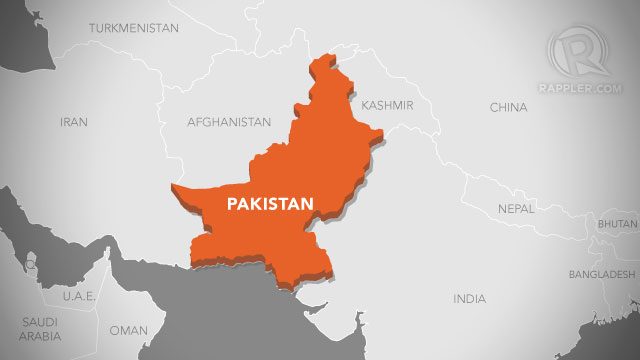SUMMARY
This is AI generated summarization, which may have errors. For context, always refer to the full article.

MIRANSHAH, Pakistan (UPDATED) – Thousands of Pakistani troops launched a long-awaited ground offensive Sunday, June 15, to eliminate Taliban and Al-Qaeda militants from the troubled North Waziristan tribal region a week after a brazen insurgent attack on Karachi’s airport.
The airport siege was claimed by Taliban and Uzbek militants holed up in the district on Afghanistan’s border – considered the last remaining stronghold of Islamist militants – in an assault that killed 38, including ten attackers, and left a nascent peace process in tatters.
An operation on North Waziristan has been a long-standing demand of Pakistan’s Western allies, including the United States which accuses Islamabad of using the area to give sanctuary to the Haqqani network of fighters, known for their spectacular raids on NATO targets inside Afghanistan.
The offensive came just hours after overnight airstrikes killed at least 105 people in the region including insurgents linked to the Karachi airport attack, according to the military – though local officials placed the toll as high as 150.
“On the directions of the Government, Armed forces of Pakistan have launched a comprehensive operation against foreign and local terrorists who are hiding in sanctuaries in North Waziristan,” a military statement said.
Khawaja Asif, the minister of defense, added: “The Pakistani nation is fully behind its armed forces. Directions have been given to eliminate terrorists who were responsible for the slaughter of innocent Pakistani civilians and law enforcement officials.”
At least 10 militants were killed in attacks by Pakistani gunship helicopters in the village of Mir Ali, a local intelligence official in Miranshah said, as the fighting got underway.
‘Thousands of troops’
A military official in the main town of Miranshah told Agence France-Presse: “Thousands of troops will participate in this action. You can roughly say 25,000 to 30,000 troops will be involved in the operation.”
“We are trying to finish this operation as soon as possible but can’t give an exact time frame. It can conclude in a few days but can also take longer,” he added.
One official said the alleged Uzbek mastermind of the Karachi attack had been killed in the overnight air strikes, with the military officially placing the toll at 105.
“Abu Abdul Rehman Almani, who was mastermind of attack on Karachi airport, and several other commanders have been killed in the strikes,” he said.
Shoot-on-sight orders meanwhile have been imposed on residents who leave their homes after dark, according to local intelligence officials and residents, leading to two people from the Sarai Darpa Khel area near Miranshah being critically wounded.
Some 40 percent of the region’s population of half a million have already fled, leaving around 300,000 behind, multiple residents told Agence France-Presse.
In the district’s main town of Miranshah, imams made announcements from mosque loudspeakers asking people to recite from the Koran and pray to God for the safety of those who had remained behind.
US drones were also spotted hovering above the area, raising suspicion that Washington and Islamabad were coordinating their efforts after two drone attacks – the first this year – killed 16 militants on Wednesday, June 11.
Washington reportedly suspended drone attacks in December to give Islamabad time to pursue peace talks with the Pakistani Taliban aimed at ending a 7-year insurgency that has claimed thousands of lives.
Dialogue over
The dialogue resulted in a month-long ceasefire between March and April, but later broke down, with Pakistan resuming air strikes on suspected militant hideouts in the tribal areas.
The army was widely seen as being opposed to the dialogue because of the heavy casualties it has sustained at the hands of the TTP.
But following the Karachi attack, Asif, the defense minister, signaled the time for talks was now over.
“We as a government tried our level best to resolve this crisis through dialogue. We were frustrated through attacks on innocent Pakistanis and damage to national assets,” he said.
“This operation will continue till the surrender or elimination of enemy.”
Talat Masood, a retired general and security analyst said the army would aim to end its operation before the Islamic holy month of Ramadan which begins around June 28.
“It should go only for two three weeks and then troops can be stationed in the area to control the situation and consolidate the positions,” he said.
The operation’s success, he added, was contingent on sealing the porous Pakistan-Afghanistan border which foreign fighters including Chechens, Uzbeks, Turkmen, Tajiks and Uighurs have crossed in recent weeks.
A late-night military statement said Afghan security forces “have been requested to seal the border on their side to facilitate elimination of terrorists who attempt to cross the border”.
It added announcements would be made for local residents to approach designated evacuation points.
“Surrender points have also been made for those militants who chose to quit violence and give up their arms,” it said, without elaborating on their fate. – Rappler.com
Add a comment
How does this make you feel?
There are no comments yet. Add your comment to start the conversation.